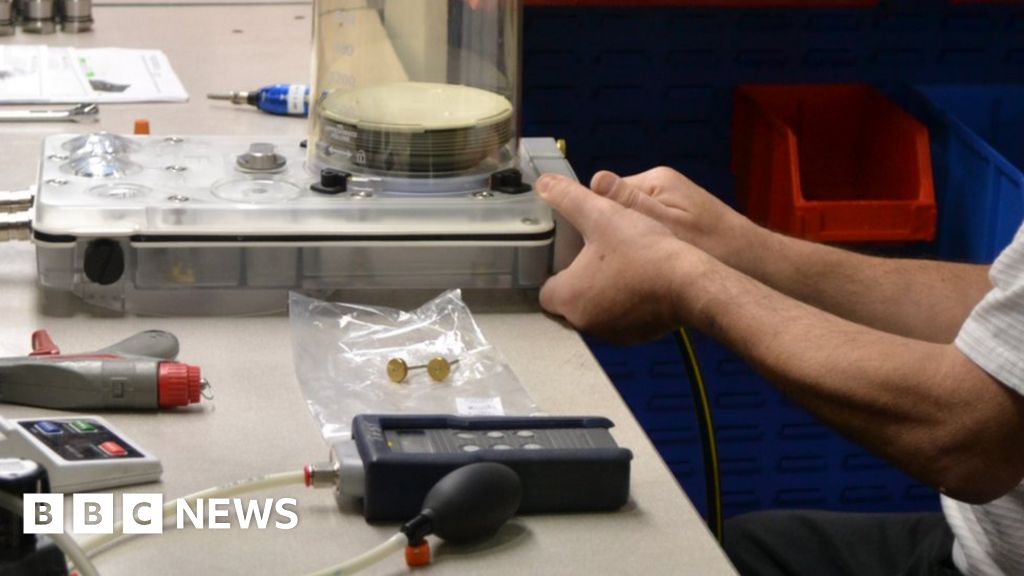Coronavirus: Ventilator Built By Airbus And F1 Approved

 Image copyright
VentilatorChallengeUK
Image copyright
VentilatorChallengeUK
The first new medical ventilator to treat people with severe symptoms of Covid-19 has been approved in the UK.
Hundreds of the Penlon Prima ESO2, which is an updated version of an existing model, are expected to be built for hospitals over the next week.
But the consortium of major firms that helped to develop it hopes to make about 1,500 a week by the start of May.
The government has said it needs to increase ventilator stocks from 10,000 to 18,000 to cope with the pandemic.
But some have cast doubt on whether it can meet this goal fast enough.
On Thursday, following the approval by the Medicines and Healthcare products Regulatory Agency (MHRA), the government said it had confirmed an order for 15,000 of the new Penlon devices.
A Cabinet Office spokesman said the devices would be delivered over the coming months and it would continue to consider additional bids from other consortiums.
Cabinet Secretary Michael Gove said it showed "the significant progress being made" after big manufacturers were asked to help ramp up production.
Firms including Siemens, Airbus, Ford and a number of Formula 1 teams worked with Penlon, a medical device maker, to adapt its ventilator so that it could be mass-produced at speed.
Under normal circumstances, Penlon would only be able to make 50 to 60 ventilators a week.
In line with updated MHRA rules, the ESO2 can also be switched on and off more easily, allowing liquid to be regularly drained from patients' lungs - something the sickest Covid-19 patients can require on an hourly basis.
Dick Elsy, chair of the VentilatorChallengeUK consortium which is making the device, said it had undergone "stringent testing and clinical trials for the last two weeks".
"Ventilators of this type are complex and critical pieces of medical equipment, so ensuring the absolute adherence to regulatory standards and meeting clinical needs were always our priorities," he said.
Airbus' Broughton site, which makes wings for commercial aircraft, Ford's Dagenham engine factory and McLaren's Woking site are helping to produce the ESO2.
The consortium also said it was ramping up production of another existing design, the Smiths Group paraPAC, which is used for less acute patients.
A number of other businesses are also involved in designing new ventilators, including Dyson.
However, the government recently abandoned plans to buy a device developed by a group including the Renault and Red Bull Formula one teams, because it was not considered suitable for treating Covid-19 patients.
It is exactly a month since the government appealed to businesses across the UK for help manufacturing ventilators and components for the NHS.
Since then there has been some progress - production of an existing design, the Smiths Group paraPAC, is already being ramped up. And the Mercedes F1 team has been building a simpler breathing aid in large quantities.
But until today none of the much-hyped new designs had received official approval - and the government was facing criticism in some quarters for initially specifying machines that were allegedly ill-suited to the treatment of Covid-19 patients.
Now production of the Penlon-designed machine can begin in earnest, drawing on the combined know-how of companies such as Airbus, Ford and McLaren.
The government had been expected to buy about 5,000 of the machines. In fact, it's ordered 15,000 - a measure perhaps of its relief that deliveries to the NHS can now start in earnest.
From Chip War To Cloud War: The Next Frontier In Global Tech Competition
The global chip war, characterized by intense competition among nations and corporations for supremacy in semiconductor ... Read more
The High Stakes Of Tech Regulation: Security Risks And Market Dynamics
The influence of tech giants in the global economy continues to grow, raising crucial questions about how to balance sec... Read more
The Tyranny Of Instagram Interiors: Why It's Time To Break Free From Algorithm-Driven Aesthetics
Instagram has become a dominant force in shaping interior design trends, offering a seemingly endless stream of inspirat... Read more
The Data Crunch In AI: Strategies For Sustainability
Exploring solutions to the imminent exhaustion of internet data for AI training.As the artificial intelligence (AI) indu... Read more
Google Abandons Four-Year Effort To Remove Cookies From Chrome Browser
After four years of dedicated effort, Google has decided to abandon its plan to remove third-party cookies from its Chro... Read more
LinkedIn Embraces AI And Gamification To Drive User Engagement And Revenue
In an effort to tackle slowing revenue growth and enhance user engagement, LinkedIn is turning to artificial intelligenc... Read more

